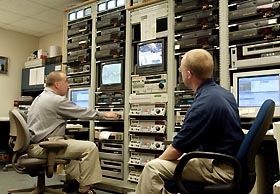|
This is an archived article.
For the latest news, go to the Advance
Homepage
For more archives, go to the Advance Archive/Search Page. |
||
|
Husky Video Service Helps UConn
Teams Gain The Winning Edge By Richard Veilleux
visitors. Across the room, floor to ceiling, stand no fewer than 15 televisions, two computers, about 15 editing machines, and other video equipment. All the televisions are tuned to football games.
But nobody is relaxed, and there's no beer, no chips, to be found. In fact, the scene is often frantic. "From August through April, we go seven days a week," says Kaplan, director of UConn Husky Video. The two-man department is responsible for providing UConn's varsity athletic coaches with videotape of their team's practices and opponents' games, sliced and diced into tiny segments of game footage. "Kent State only had third down and one yard to go for a first down four times in their last few games," assistant director Jason Isenberg explains, changing the tapes in four different VCRs. "But we'll break that out. And we'll do another tape for second and long, another for third and long," he adds, changing the tapes again as he talks. Meticulous Analysis
Nothing is left to the imagination. What plays will Navy run on third down and long? Second down and short? What goal line defense is Iowa State likely to run when they play UConn Nov. 23? What are the Hawkeyes' tendencies and tricks when they try to block a punt? Which cornerback is likely to blitz in what situation? Kaplan and Isenberg have it all, and the Husky coaches get it all. During the season, football coach Randy Edsall puts in between 40 and 50 hours a week with the tapes, watching film between team meetings, evaluating UConn game and practice film, and scouting opponents' game films. "What Kappy (Kaplan) and his staff do is critical to this team in so many areas," Edsall says. "It allows us to analyze both ourselves and our opposition in ways that could never have been done years ago, and it gives us as coaches an insight into our own team that even we can't gather during games and practices from the field." Margin of Excellence
Once the tapes arrive in Storrs the next morning, Kaplan and Isenberg - like video staff across the country using UConn's game film - hunch over editing machines and computers and break down the opponent. "It's an even playing field with the exchange of tapes," Kaplan says. "But what you do after you get the tapes — the quality of the staff is where you make a difference: how in-depth the tapes are, how well we - and the coaches - analyze the game tapes to find the other team's tendencies. It's all about tendencies. It's a real chess match." These days, time is precious for Kaplan and Isenberg - it's the time of year when football and basketball, men's and women's, intersect. The men's and women's soccer teams use video as well, although to a lesser extent, as do all of UConn's other athletic teams. Kaplan hires students - both undergraduates and graduate students - to film the teams' practices and help him and Isenberg film games. The two use four cameras for football, two for most basketball events. Going Digital
Kaplan expects to be fully automated when the new Rentschler Field opens next fall. Some advances have been made already. "We have computer jacks in every room where there could be a football meeting, and Coach Edsall can use his laptop to access the tapes stored in our computers," Kaplan says. "He can pull up any play or series of plays he wants without sending a runner to get a tape or trying to find us." Edsall welcomes the new technology: "The Pinnacle technology is great," he says. "If we're having trouble in one very specific area of the game, like on third and long, or when facing a certain defensive alignment, we can almost instantly pull up every time we've been in that situation all season and assess what we're not doing right. "And with the new laptops," he adds, "we can even start working on our next opponent on the plane ride back from a road game." As the Huskies prepare to join the Big East football conference in 2005, those road games will grow in importance. So, too, will Husky Video Services. |
 ave Kaplan's office is
a couch potato's dream. Near his desk, a soft, deep sofa
embraces
ave Kaplan's office is
a couch potato's dream. Near his desk, a soft, deep sofa
embraces
